Postal address: Box 117, SE-22100 Lund, Sweden
Visiting address: Allhelgona kyrkogata 14 M
Web page: http://www.genus.lu.se/o.o.i.s/4737
Contact person: Sara Goodman, Head of Department, phone: +46 (0)46 222 44 02
The Department of Gender Studies is an interdisciplinary department under the Social Science Faculty at Lund University. It offers courses in gender studies from bachelor level to PhD studies. Research within the department is conducted within several fields and from a diverse collection of theoretical perspectives.
Research connected to South Asia

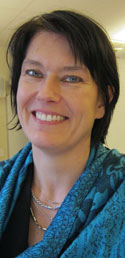 Professor Helle Rydström holds a PhD in Social Anthropology/Child Studies from Linköping University (1999) and has held a 4-year Research Fellow position at the Center for East and South-East Asian Studies (ACE), Lund University. In 2007, she was a visiting scholar at the Center for the Study of Gender and Sexuality at the New York University, USA, and in 2003, she was a visiting scholar at the York Institute for Asian Research at York University, Toronto, Canada. Her research covers a number of intimately intertwined topics studied first of all in Vietnam, but also in Cambodia and India. Together with Dr. Diana Mulinari, Prof. Rydström has established the Global Gender Matters seminar series at Lund University.
Professor Helle Rydström holds a PhD in Social Anthropology/Child Studies from Linköping University (1999) and has held a 4-year Research Fellow position at the Center for East and South-East Asian Studies (ACE), Lund University. In 2007, she was a visiting scholar at the Center for the Study of Gender and Sexuality at the New York University, USA, and in 2003, she was a visiting scholar at the York Institute for Asian Research at York University, Toronto, Canada. Her research covers a number of intimately intertwined topics studied first of all in Vietnam, but also in Cambodia and India. Together with Dr. Diana Mulinari, Prof. Rydström has established the Global Gender Matters seminar series at Lund University.
More information on her personal web page.
Helle has been appointed a member of SASNET’s board for the period 2013-15. More information.
In November 2010, Prof. Rydström was awarded SEK 3.3 m as a three-years grant for the period 2011-13 from Sida/SAREC’s Developing Country Research Council for a comparative research project entitled ”Recognition and Homosexuality: The Socio-Cultural Status of Same-Sex Relations in India and Vietnam”. More information.
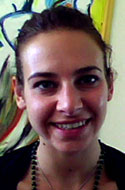 PhD candidate Maria Tonini is working on a research project on homosexuality in a non-Western setting, namely contemporary neo-liberal Hindu/Muslim India. The project, entitled ”Same-Sex Sexualities and Recognition in Contemporary India”, intends to fill a gap the knowledge about homosexuality in a non-Western setting, namely contemporary Hindu/Muslim India. The project addresses directly the intersections between the recent decriminalization of homosexuality in India, human rights, globalization and India’s post-colonial status. It will bring into dialogue current Western studies on (‘queer’) sexualities with the constructions of sexualities in India, and in doing so examine how the rights of female and male homosexuals in today’s India might be constrained, or facilitated.
PhD candidate Maria Tonini is working on a research project on homosexuality in a non-Western setting, namely contemporary neo-liberal Hindu/Muslim India. The project, entitled ”Same-Sex Sexualities and Recognition in Contemporary India”, intends to fill a gap the knowledge about homosexuality in a non-Western setting, namely contemporary Hindu/Muslim India. The project addresses directly the intersections between the recent decriminalization of homosexuality in India, human rights, globalization and India’s post-colonial status. It will bring into dialogue current Western studies on (‘queer’) sexualities with the constructions of sexualities in India, and in doing so examine how the rights of female and male homosexuals in today’s India might be constrained, or facilitated.
This study aims at highlighting the relation between secularism, religion and democracy from the point of view of homosexuals. Through a feminist perspective, my aim is to explore how sexualities are constructed in India, and how they intersect with democratic ideals and respect for human rights.
 Data has been collected in an Indian field site and contrasted with empirical findings, for instance, from Sweden. The material will consist of a combination of qualitative individual interviews and focus group interviews, first of all with homosexuals but also with NGO organizations and politicians. In addition, Maria will carry out a discourse analysis of legal documents and media debates in India. Choosing the perspective of homosexuals means that the study will provide a new angle from which it will be possible to examine social, political and cultural changes in a non-Western, yet globally speaking highly influential country.
Data has been collected in an Indian field site and contrasted with empirical findings, for instance, from Sweden. The material will consist of a combination of qualitative individual interviews and focus group interviews, first of all with homosexuals but also with NGO organizations and politicians. In addition, Maria will carry out a discourse analysis of legal documents and media debates in India. Choosing the perspective of homosexuals means that the study will provide a new angle from which it will be possible to examine social, political and cultural changes in a non-Western, yet globally speaking highly influential country.
On 28 October 2015, Maria has her final seminar, with Professor Don Kulick from Dept. of Comparative Human Development, University of Chicago & Dept. of Cultural Anthropology and Ethnology, Uppsala University, as seminar opponent. Photo from the occasion©lars eklund.
Maria Tonini will defend her doctoral dissertation in early 2016.
Previously Maria Tonini has completed a Masters degree in Critical Media and Cultural Studies from the the School of Oriental and African Studies (SOAS), University of London (in 2006), and then worked as a Researcher and Online Editor for the Ethnic Multicultural Media Academy (EMMA) in London. After that she worked as Fundraising Assistant for the Indian National Trust For Art and Cultural Heritage (INTACH) in Pondicherry, India.
In 2008, Maria Tonini – originaly an Italian citizen – moved to Sweden, and worked for five months as an assistant for SASNET on a voluntary basis. She was engaged in updating web pages and reporting from conferences and seminars.
In 2009, she spent one year at Delhi University as a scholarship holder in the Erasmus Mundus Action 2 Indo-European mobility programme lot 15 administered by Lund University (more information).
 On 4 November 2014, Helle Rydström was granted a development research grant from the Swedish Research Council (total amount SEK 4.0 m in five years, 2015-19) for a Asia related project entitled ”Climate Disasters and Gendered Violence in Asia: Vulnerability and (In)Security in the Aftermath of Catastrophes in Pakistan, the Philippines, and Vietnam”, to be carried out in collaboration with Professor Catarina Kinnvall, Dept. of Political Science, Lund University; and Dr. Huong Nguyen, Lecturer Dept. of Anthropology, Hanoi University, Vietnam. The local collaboration partner in Pakistan is Professor Durre Ahmed at the Center for Studies of Gender and Culture, Lahore University.
On 4 November 2014, Helle Rydström was granted a development research grant from the Swedish Research Council (total amount SEK 4.0 m in five years, 2015-19) for a Asia related project entitled ”Climate Disasters and Gendered Violence in Asia: Vulnerability and (In)Security in the Aftermath of Catastrophes in Pakistan, the Philippines, and Vietnam”, to be carried out in collaboration with Professor Catarina Kinnvall, Dept. of Political Science, Lund University; and Dr. Huong Nguyen, Lecturer Dept. of Anthropology, Hanoi University, Vietnam. The local collaboration partner in Pakistan is Professor Durre Ahmed at the Center for Studies of Gender and Culture, Lahore University.
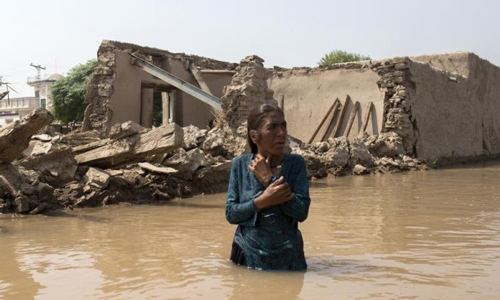 Project abstract: On November 8, 2013, super Typhoon Haiyan (Yolanda) took landfall on the Philippines. It was one of the strongest storms ever recorded and climate changes were suspected to have facilitated the extreme weather conditions. The typhoon caused the death of more than 6,000 people, displaced around 4 million, and affected at least 12 million Philippines. While the devastating storm was breaking news, its precarious aftermath has received only little attention in global media. A climate catastrophe causes tragic deaths, ruins daily life, destroys materials, and disrupts societies. In this sense, no person or item is spared. Yet reports indicate that those who experience the greatest negative impacts after a climate disaster are the people who were already vulnerable and marginalized prior to the destructive event. Climate disasters seem to fuel imbalances due to gender (as intertwined with age, ethnicity, sexuality, and economy) and exacerbate male-to-female violence. In the aftermath of a climate catastrophe, abuse against women and girls thus tends to increase for a number of reasons, such as a lack of safety in resettlement areas and shelters, the collapse of a society’s socio-cultural infrastructure and safety systems, violence perpetrated by a partner or a relative, and the commodification of female bodies.
Project abstract: On November 8, 2013, super Typhoon Haiyan (Yolanda) took landfall on the Philippines. It was one of the strongest storms ever recorded and climate changes were suspected to have facilitated the extreme weather conditions. The typhoon caused the death of more than 6,000 people, displaced around 4 million, and affected at least 12 million Philippines. While the devastating storm was breaking news, its precarious aftermath has received only little attention in global media. A climate catastrophe causes tragic deaths, ruins daily life, destroys materials, and disrupts societies. In this sense, no person or item is spared. Yet reports indicate that those who experience the greatest negative impacts after a climate disaster are the people who were already vulnerable and marginalized prior to the destructive event. Climate disasters seem to fuel imbalances due to gender (as intertwined with age, ethnicity, sexuality, and economy) and exacerbate male-to-female violence. In the aftermath of a climate catastrophe, abuse against women and girls thus tends to increase for a number of reasons, such as a lack of safety in resettlement areas and shelters, the collapse of a society’s socio-cultural infrastructure and safety systems, violence perpetrated by a partner or a relative, and the commodification of female bodies.
Despite attention from international aid organizations, no substantial research has been carried out on the violence inflicted upon females of particular ages, sexualities, ethnicities, and classes in the aftermath of a climate disaster. This serious lacuna will be addressed directly by this research project. The project, which is both interdisciplinary and ethnographic in character, will conduct a thorough examination of climate change related violence against women and girls. At the core of the project are three carefully selected countries, namely Pakistan, the Philippines, and Vietnam, each of which is indicative of certain tendencies in the Asia-Pacific region and which recently have been hit by climate disasters. Focusing on the complex ways in which gender and climate changes are intimately intertwined, the project will provide new and critical knowledge about an urgent and understudied problem. The results will be of significance for the researched countries, the abused female survivors, their families and networks, as well as for national and international aid organizations focused on the prevention of violence against women and girls in the aftermath of climate catastrophes. The insights will also be of significance outside the Asia-Pacific region. Any country prone to erosion, floods, and earthquakes with a willingness to prevent and combat gender specific violence, will benefit from the results. In all, the project will improve the design and development of gender informed climate coping and mitigation strategies at a local, national, regional, and international level. More information about Swedish Research Council grants to South Asia related projects 2014.

Prof. Helle Rydström and Prof Catarina Kinnvall participated in an International Conference on ”Re Orienting Gender: Geographies of Resistance, Agency, Violence and Desire in Asia” in New Delhi, India, organised by the Department of Geography at University of Delhi. The convener was Dr. Anindita Datta, who has links to the Dept. of Gender Studies. SASNET supported the participation of Rydström and Kinnvall. Read the conference report by Linda Hiltmann, SASNET.
ICCR Professorship 2010/11
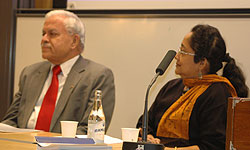 During the period November 2010 – April 2011, Professor Lipi Ghosh from the Dept. of South and South East Asian Studies, Calcutta University in Kolkata, India, was based at the Department of Gender Studies, as the first Visiting ICCR (Indian Council for Cultural Relations) Chair Professor at Lund University. As a visiting professor at Lund University, Prof. Ghosh was primarily engaged in research. She is working on a collaborative major research project, sponsored by the University Grants Commission, entitled ”India’s Past Cultural Fabrics in Southeast Asia: A Study of Dvaravati Civilization of Ancient Siam”. She is also taking interest in the subject of India – Southeast Asia Relations in the post-colonial era. Lipi Ghosh runs two ongoing project works in this field, one on ”Indo–Thai Relations in the Context of Changing Globalized World”, and another one on ”Thai Cultural Identity in Northeast India: A Study of Tai Ahoms”.
During the period November 2010 – April 2011, Professor Lipi Ghosh from the Dept. of South and South East Asian Studies, Calcutta University in Kolkata, India, was based at the Department of Gender Studies, as the first Visiting ICCR (Indian Council for Cultural Relations) Chair Professor at Lund University. As a visiting professor at Lund University, Prof. Ghosh was primarily engaged in research. She is working on a collaborative major research project, sponsored by the University Grants Commission, entitled ”India’s Past Cultural Fabrics in Southeast Asia: A Study of Dvaravati Civilization of Ancient Siam”. She is also taking interest in the subject of India – Southeast Asia Relations in the post-colonial era. Lipi Ghosh runs two ongoing project works in this field, one on ”Indo–Thai Relations in the Context of Changing Globalized World”, and another one on ”Thai Cultural Identity in Northeast India: A Study of Tai Ahoms”.
 On Monday 15 November 2010, SASNET organised her inaugural lecture as new ICCR Professor at Lund University. Her presentation was entitled ”Ethnicity, Religion and Nation Building: The Northeast Indian Profile”. (read an abstract).
On Monday 15 November 2010, SASNET organised her inaugural lecture as new ICCR Professor at Lund University. Her presentation was entitled ”Ethnicity, Religion and Nation Building: The Northeast Indian Profile”. (read an abstract).
The Indian Ambassador to Sweden, H.E. Mr. Ashok Sajjanhar (on photo along with Prof. Ghosh) was the guest of honour, and he gave a presentation on ”India-Sweden Bilateral Relations”. Lund University was represented by Professor Sven Strömquist, Assistant Vice-Chancellor; Dr. Ann-Katrin Bäcklund, Dean of the Faculty for Social Sciences; Dr. Kerstin Sandell, Head of department, Centre for Gender Studies; and Dr. Anna Lindberg, SASNET. See full seminar programme.
More information about the inaugural seminar.
Guest Researchers from India

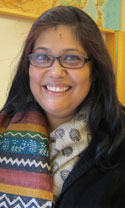 Professor Anindita Datta from the Department of Geography, Delhi School of Economics, University of Delhi, India, spent one month during the Fall 2012 as an Erasmus Mundus Action 2 scholarship holder through the EMEA Asia Regional programme, coordinated by Lund University. More information about the EMEA programme.
Professor Anindita Datta from the Department of Geography, Delhi School of Economics, University of Delhi, India, spent one month during the Fall 2012 as an Erasmus Mundus Action 2 scholarship holder through the EMEA Asia Regional programme, coordinated by Lund University. More information about the EMEA programme.
Prof. Datta’s research interests focus on the critical geographies of gender, space and society, spanning the critical analysis of policy to a nuanced understanding of gender and its transformations in the wake of social change.
On Friday 21 September 2012, Prof. Datta held a SASNET lecture at Lund University on ”Genderscapes and their link to Natural Landscapes in India”. The seminar was organized jointly by SASNET and the Centre for East and South East Asian Studies (ACE). Venue: ACE, Scheelevägen 15 D. In her presentation, Dr. Datta theorised the influence of natural landscape or terrain on the initial construction of feminine gender roles and eventually of the dominant ‘genderscapes’ in India. More information.

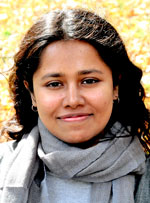 Dr. Aneeta Rajendran, Assistant Professor at the Department of English, Gargi College, University of Delhi, was also selected as an Erasmus Mundus Action 2 scholarship holder through the EMEA Asia Regional programme. She worked at the Centre as a Post doc for a period of 9 months during the academic year 2012/13, beginning in September 2012. She is working on queer Indian visual and literary cultures, with a strong focus on popular genres like the comic-book.
Dr. Aneeta Rajendran, Assistant Professor at the Department of English, Gargi College, University of Delhi, was also selected as an Erasmus Mundus Action 2 scholarship holder through the EMEA Asia Regional programme. She worked at the Centre as a Post doc for a period of 9 months during the academic year 2012/13, beginning in September 2012. She is working on queer Indian visual and literary cultures, with a strong focus on popular genres like the comic-book.
Aneeta defended her doctoral thesis at Jawaharlal Nehru University (JNU) in Delhi, in 2010. Her doctoral work focused on female non-heteronormativity in contemporary Indian literary and visual cultures, and she now hopes that the intellectual exposure to a European academic space will provide firsthand contact with much of the Euro-American theory that many of the Third World researchers use. The thesis, entitled ”In the Realm of the UnFamiliar: Studies in Contemporary Lesbian Indian Texts”, is the only full-length examination of contemporary literary female non-heteronormativity. Her scholarly interests extend to translation studies, contemporary Indian cinema, and popular visual and literary cultures. Dr. Rajendran works on a project entitled , where she studies how contemporary lesbian Indian texts represent the apparently unfamiliar of female non-heteronormative desire, located in apparently mundane and familiar spaces, of home, family, nation and diaspora, and the many spaces they validate.
Linnaeus Palme Exchange Programme
 In March 2013, the International Programme Office for Education and Training (Internationella Programkontoret) decided to give the department SEK 151 332 as an initial Linnaeus Palme International Exchange programme grant with the Centre of Gender Studies at Delhi School of Economics, University of Delhi, India to develop collaboration on teachers and students exchange during the period 2013-14. More information about the South Asia related Linnaeus Palme projects for 2013-14.
In March 2013, the International Programme Office for Education and Training (Internationella Programkontoret) decided to give the department SEK 151 332 as an initial Linnaeus Palme International Exchange programme grant with the Centre of Gender Studies at Delhi School of Economics, University of Delhi, India to develop collaboration on teachers and students exchange during the period 2013-14. More information about the South Asia related Linnaeus Palme projects for 2013-14.
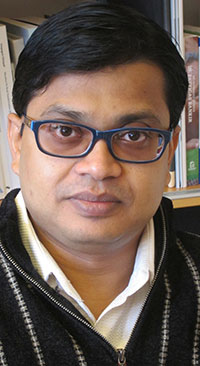 In early October 2013, a delegation from Delhi came to Lund for planning the continued project. The Indian coodinator is Associate Professor Anindita Datta, and she was accompanied to Sweden by Dr. Ashis K Saha (photo) from the same department, the Dept. of Geography, Delhi School of Economics.
In early October 2013, a delegation from Delhi came to Lund for planning the continued project. The Indian coodinator is Associate Professor Anindita Datta, and she was accompanied to Sweden by Dr. Ashis K Saha (photo) from the same department, the Dept. of Geography, Delhi School of Economics.
On Thursday 3 October, Dr Saha made a courtesy visit to SASNET, and had a discussion with Lars Eklund. Dr. Saha, originally hailing from Kolkata, is working as Assistant Professor and specialises in Remote Sensing, GIS.
As part of the Linnaeus Palme collaboration, Anindita Datta came back to Lund in May 2014 and November–December 2015 to spend time at the Dept. of Gender, giving lectures and seminars.
This project has received continued funding for the period 2015-16 with SEK 197 631. More information about South Asia related Linnaeus Palme programme grants for 2015-16. ![]()
Two students from Delhi University are spendig time at Lund University as exchange students through the LP programme during the winter 2015-16, they are Shirinji Bhattacharjee and Rupsa Ghosh.